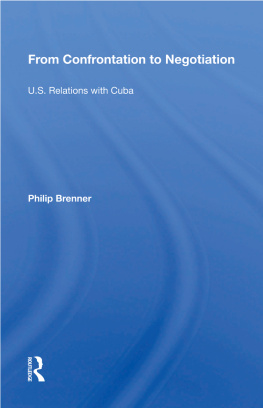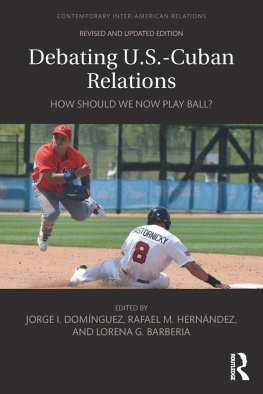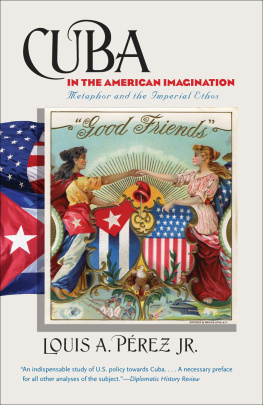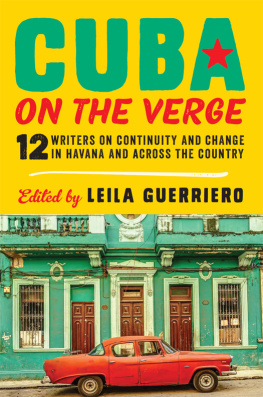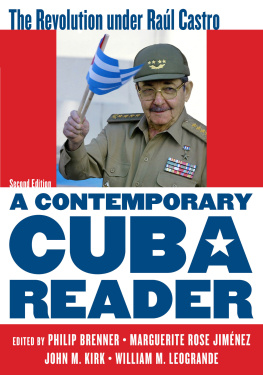FROM CONFRONTATION TO NEGOTIATION
U.S. Relations with Cuba
About the Book and Author
Nearly thirty years have passed since the United States first attempted to overthrow the fledgling Castro government. Despite enormous changes in the hemisphere, significant developments in the nature of Cuba's international relations, and an end to the cold war consensus in the United States that quietly sanctioned interference in and obstruction of Third World politics, U.S. policy toward Cuba has changed very little: It still embodies the failed dream of isolating Cuba and destroying the Cuban revolution.
In From Confrontation to Negotiation: U.S. Relations with Cuba, Philip Brenner provides a thoughtful overview of U.S.-Cuban relations since 1898, with an emphasis on the past ten years. Assumptions, goals, and continuities in U.S. policy are highlighted. He then offers a clear picture of the issues that divide the two countries and around which any discussions for a normalization of relations would likely turn.
Could discussions occur? Is a call for a less hostile relationship between the United States and Cuba politically feasible? What are the chances that Cuba and the United States can actually work out an accommodation? Dr. Brenner analyzes the domestic political factors in each country that shape policy and that might present possibilities for serious discussion. He then proposes a workable alternative Cuban policy for the United States that takes into account the fundamental concerns of both countries. The policy proposal is related to the framework adopted by Policy Alternatives for the Caribbean and Central America (PACCA).
Philip Brenner is associate professor of international relations at The American University, where he teaches in the. Washington Semester Program. He is a member of the board of the National Security Archive and is author of The Limits and Possibilities of Congress (1983).
From Confrontation to Negotiation
U.S. Relations with Cuba
Philip Brenner
A PACCA BOOK
First published 1988 by Westview Press
Published 2018 by Routledge
52 Vanderbilt Avenue, New York, NY 10017
2 Park Square, Milton Park, Abingdon, Oxon OX14 4RN
Routledge is an imprint of the Taylor & Francis Group, an informa business
Copyright 1988 by Policy Alternatives for the Caribbean and Central America
All rights reserved. No part of this book may be reprinted or reproduced or utilised in any form or by any electronic, mechanical, or other means, now known or hereafter invented, including photocopying and recording, or in any information storage or retrieval system, without permission in writing from the publishers.
Notice:
Product or corporate names may be trademarks or registered trademarks, and are used only for identification and explanation without intent to infringe.
Library of Congress Cataloging-in-Publication Data
Brenner, Philip.
From confrontation to negotiation: U.S. relations with Cuba/
Philip Brenner.
p. cm.
Bibliography: p.
Includes index.
ISBN 0-8133-7507-X. ISBN 0-8133-7509-6 (pbk.)
1. United StatesForeign relationsCuba. 2. CubaForeign
relationsUnited States. 3. United StatesForeign
relations1981- 4. CubaForeign relations1959- I. Title.
E183.8.C9B74 1988
327.7307291dc19 87-33985
CIP
ISBN 13: 978-0-367-01434-6 (hbk)
THIS BOOK EVOLVED from a short paper prepared for a conference sponsored by Policy Alternatives for the Caribbean and Central America (PACCA), an association of scholars and policymakers. Its development owes much to the dedicated effort of the people associated with PACCAas well as to those not affiliated with the organizationwho gave much time helping me to refine the analysis and to elaborate essential portions of the book. In this sense the book was a group project, though its flaws remain mine.
A few people provided extensive comments on the entire manuscript (and in some instances on several drafts of the manuscript). Much appreciation goes to Sylvia Arrom, Carolee Bengelsdorf, Carmen Diana Deere, Saul Landau, and William LeoGrande. Several others gave me very useful suggestions at various stages in the project and no doubt will recognize their handiwork in the final product: Michael Conroy, Margaret Crahan, Xabier Gorostiaga, Richard Fagen, Peter Hakim, Rafael Hernandez, Stuart Lippe, Charles William Maynes, Marifeli Perez-Stable, Robert Pastor, Barry Sklar, Wayne Smith, and Raul Suarez.
Essential to the entire project have been the untiring efforts of the PACCA staffRobert Stark, Colin Danby, and Alicia Torres. They helped to make this a group project by coordinating the disparate network of scholars who contributed to the creation of the book. Their concern about the book's audience, manifested through consultations with key people and through follow-up and study guides, will help make the book more useful to students, scholars, and policymakers.
My editors at Westview PressBarbara Ellington, Beverly LeSuer, and Marian Safranasked insightful questions that sharpened the analysis and suggested changes that in every instance enhanced the quality of the book. It was a pleasure to work with professionals who pay such scrupulous attention to detail.
I received significant support from The American University, which provided a research grant that enabled me to compile data for the book and to write one draft. Additional assistance came from the National Security Archive, the National Council on United States-Cuban Relations, and PACCA for trips to Cuba during which I conducted interviews with Cuban leaders.
Some authors are lucky enough to have parents who take a small interest in their work. I had the great fortune that my mother, Lillian Brenner, also provided essential research for the book. With great love, devotion, and intelligence, she would scour newspapers and magazines for articles about Cuba and rush them to me.
My daughter, Sarah, was born during the course of writing this book. The unending joy she brings bolstered me on dreary days and added special purpose to the project. My hope is that the book can contribute to reduced tension between the United States and Cuba and thereby help to promote a more peaceful world for her.
Throughout the creation of this book, from its days as a briel essay to its development as papers presented at scholarly meetings to its unfolding through several drafts, my wife, Betsy Vieth, has given me wise counsel, enthusiastic support, and a home atmosphere conducive to inquiry and writing. Ultimately the book was a family project too.
Philip Brenner
Introduction:
Realism About Cuba
AT A MEETING OF THE JOINT CHIEFS OF STAFF a few months before the U.S.-sponsored Bay of Pigs invasion in April 1961, talk among the generals began to turn casually around the possibility of an invasion by U.S. troops. To the commandant of the Marine Corps, General David M. Shoup, it was clear that his colleagues envisioned Cuba as a small island, perhaps a hundred miles long. He realized that an invasion plan based on such a major misperception would lead to nothing less than catastrophe, and in horror he superimposed a map of Cuba over one of the United States. The "small island" stretched from New York to Chicago.
That was neither the first time, nor the last, that U.S. officials had tried to come up with an easy solution for dealing with Cuba, based on misperceptions about it. For 150 years, would-be U.S. statesmen have seen Cuba variously as a sleepy island that could be bought, annexed, or crushed; as a mindless, unsure neophyte waiting to be wooed; and today as a puppet of the Soviet Union that threatens fundamental U.S. security. Yet Cuba does not lend itself to such facile characterizations that provide ready policy prescriptions.

